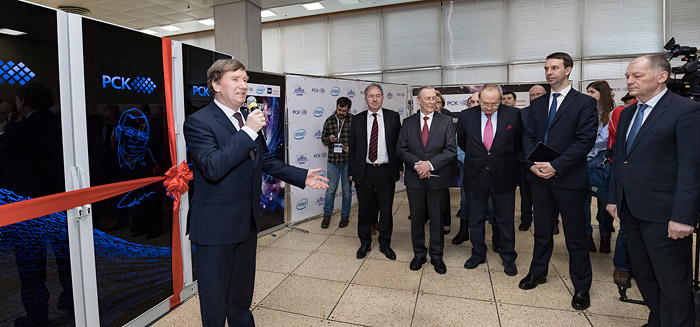
Electronic english version since 2022 |
The newspaper was founded in November 1957
| |
At the turn of the seven years
MLIT: responding to current challenges
Work on the concept and scientific programme of the Seven-Year Plan for the JINR Development has been going on for several years. LIT experts face a very difficult issue: to outline a scientific programme and formulate tasks in the rapidly developing world of information technology, when new ideas, technologies, knowledge are in constant change and it is extremely difficult to make development forecasts for 2-3 years and almost impossible - for 7 years. During the previous two seven-year periods, we significantly changed our scientific programmes, based on new trends, challenges and increasing complexity of the requirements of experiments and users. During these seven years, the largest JINR computer systems have been put into operation having not been planned in the Seven-Year Plan. In 2014, a Tier1 level centre was established at LIT for the CMS experiment at the Large Hadron Collider, today it is the largest centre in the world among all centres supporting CMS. In 2018, the Govorun supercomputer was launched that became the flagship for the development of new information technologies at JINR. For more than two years we have been working on a new Seven-Year Plan in accordance with new trends, promising tendencies in the development of IT and new requirements for the JINR scientific programme. Our programme is ambitious, corresponds to the status of our Institute and meets the requirements of the JINR scientific programme.
The concept of the development of information technologies, scientific computing and Data Science in the new Seven-Year Plan for the JINR Development provides for the development of a scientific IT ecosystem that unites many different technological solutions, trends and methods. The IT ecosystem implies the coordinated development of interconnected IT technologies and computational methods aimed at maximizing the number of JINR strategic tasks to be met that require intensive data calculations. Particular attention will be paid not only to increasing the performance of computing systems and storage system resources of the Multifunctional Information and Computing Complex (MICC), including the Govorun supercomputer, but also to the further development of the JINR network infrastructure. The most essential tasks are the development of new data processing and analysis algorithms based on deep and machine learning, including artificial intelligence, as well as the development of current Big Data methods and algorithms for addressing applied tasks.

Research in the field of quantum computing will be aimed at developing algorithms for the intelligent control of JINR physical experimental facilities and optimizing the analysis of resource-intensive tasks.
To achieve the main goals of the leading JINR projects, it will be necessary to process a large amount of experimental data. Therefore, it is necessary to develop all the components of the MICC that is the basic facility of JINR and is aimed at supporting the entire scientific programme of JINR.
Important tasks are the development and implementation of efficient methods, algorithms and software for modeling physical systems, mathematical processing and analysis of experimental data, the development of algorithms in the field of machine and deep learning, computer algebra methods and other tasks.
Along with the development of traditional areas of LIT, we focus on promising IT projects.
One of the most essential tasks is the development of a corporate digital platform "JINR Digital Ecosystem" that integrates operating and future services to support scientific, administrative and social activities, as well as maintenance of the engineering and IT infrastructures of the Institute. The platform should provide reliable and secure access to various types of data occurring in the course of the work of the Institute, from open to confidential one. The platform should provide the possibility of a comprehensive analysis of data using advanced Big Data technologies and artificial intelligence.
The Big Data development strategy at JINR is directly related to the development of the "JINR Digital Ecosystem" and includes a wide range of research: preparation of infrastructure for storing and processing Big Data (hardware and software, security); development of advanced methods and algorithms of Big Data for meeting applied tasks; intelligent monitoring of the functioning and security of distributed computing systems; provision of Big Data infrastructure for end users.
The primary task in the field of development and application of quantum computing, quantum software engineering and quantum intelligent control is the construction of quantum systems for intelligent control of physical experimental facilities, including for cases of unforeseen and unpredictable situations.
To address such complex tasks, it is necessary to ensure the training of highly qualified personnel, the development of the creative potential of young scientists and specialists who, together with leading LIT experts, are able to implement our ambitious programme.
Vladimir KORENKOV, MLIT Director